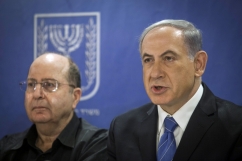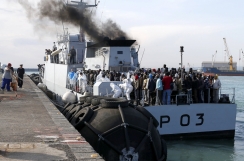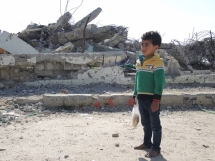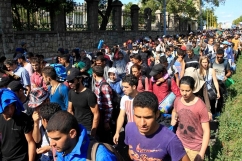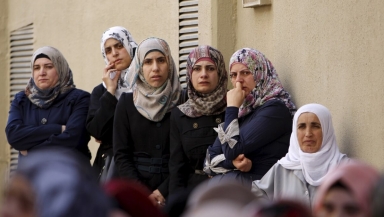
As our thoughts start to turn to Christmas, and chocolate-box images of Bethlehem, there is no escaping that these are worrying times for the land where our saviour was born. In the occupied Palestinian territory of East Jerusalem and the West Bank, there is a febrile atmosphere fuelled by weeks of violence between Israeli forces, Jewish settlers and Palestinian demonstrators. One of my friends in Jerusalem, a prominent Palestinian Christian, posted bleakly on his Facebook page: "We are facing the army of Israel, the Israeli police and 500,000 armed settlers who have orders 'Shoot to kill'".
This is not hyperbole. At the end of September, faced with growing unrest following the fatal firebombing of a Palestinian family's home in July, the Israeli government controversially relaxed the rules of engagement governing when Israeli forces can use live ammunition against Palestinian rioters – even when the targets are children or when there is no direct threat to the Israeli personnel. The result has been a sharp increase in the number of Palestinian casualties. The Palestine Red Crescent has reported this week that at least 630 Palestinians had been injured, many of them seriously, in just four days. This total includes the deaths of at least five Palestinians, including a 13-year-old boy shot in the chest in Bethlehem.
Israel will argue that it is simply exercising its legitimate right as a state to defend its own citizens. Israeli Prime Minister Binyamin Netanyahu has spoken apocalyptically of a "fight to the death against Palestinian terror". An Israeli couple, residents of a settlement near Ramallah, were murdered in front of their four children on 1 October. A few days later two Israeli men were stabbed to death on their way to pray at the Western Wall inside Jerusalem's Old City. The teenage Palestinian assailant, shot dead by police, had posted on his Facebook page: "The third intifada has begun."
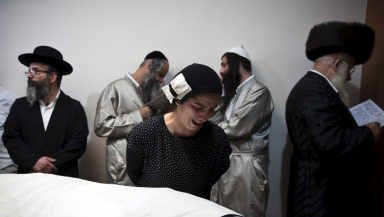
And this is the question that is exercising observers of the desperate situation in Israel and Palestine. Does the upsurge in violence herald a new intifada (the Arabic word for uprising)? Are we seeing the inevitable sequel to earlier Palestinian intifadas in 1987-1990 (which was largely non-violent, characterised by a Palestinian campaign of civil disobedience) and 2000-2005 (which was much more bloody, involving deadly suicide attacks in Israel and a brutal military intervention by Israeli forces in the occupied territory)?
The conventional wisdom until recently was that Palestinians saw no point in initiating a third uprising against the occupation, now in its 48<sup>th year, since they knew from previous experience that it would elicit just another crushing response from Israeli forces who have always favoured the 'iron fist' approach to supressing dissent. The focus instead was on non-violent resistance, in particular the promotion of a global campaign of boycott, divestment and sanctions (BDS) against the occupation. It is no coincidence that the Palestinian BDS campaign was launched in 2005 as the second intifada was beginning to fizzle out. It is also significant that Palestinian Christian leaders, who of course might have been expected to favour non-violent responses to injustice, themselves endorsed the BDS campaign in their Kairos Palestine declaration of December 2009.
But many Palestinians are now asking: what has non-violent resistance actually achieved in the last ten years? Peace talks have got nowhere and meanwhile the occupation has been consolidated, with an expansion of the separation barrier, the blockade of (and regular assaults on) Gaza, and thousands of house demolitions and land confiscations in East Jerusalem and the West Bank.
Perhaps the most egregious aspect of the occupation has been the growth in Israeli settlements in the occupied territory, despite their being widely regarded as illegal under international law. Commenting earlier this week on how the various actual and potential intifadas compare, Israeli academic Danny Rubinstein writes: "The number of Israelis living in the West Bank today is over 400,000. This is four times more than during the first intifada, and two times more than during the second. The number of Jews who live in Arab neighbourhoods of East Jerusalem has increased by hundreds of percent."

Characterising this latest outbreak of violence as the "settler intifada", Rubinstein continues: "Literally every day of the last year there were incidents of violence between settlers and Palestinians. Mutual attacks, damaged property, throwing of stones, punitive action (price tag) fires, shootings and murders. The violence was concentrated in the West Bank on roads close to Arab and Jewish villages, and in Jewish concentrations in East Jerusalem."
I think Rubinstein has a point. We may indeed be on the verge of a "settler intifada" and the violence is only going to get worse as the settlements expand. Separation barriers and checkpoints can be dismantled, demolished houses can be rebuilt and borders re-drawn. But Israel's voracious settler project – actively funded by the most pro-settler government Israel has ever known and only timidly criticised by a complacent international community – has taken on such an air of permanence that most Palestinians have tumbled into despair, seeing a two-state solution as now utterly impossible to achieve.
There are other issues inflaming and radicalising the Palestinians, including the sterility and corruption of their own Palestinian Authority, the man-made humanitarian crisis in Gaza, the re-election of a rejectionist and right-wing Israeli government which has no real vision of peace, and growing Israeli encroachments on the site of the al-Aqsa mosque in Jerusalem, Islam's third holiest site.
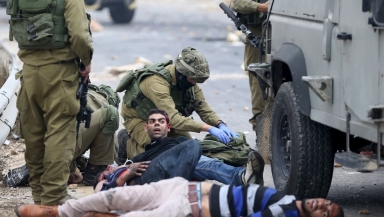
But as David Horovitz, a former editor of the Jerusalem Post, observed in a telling opinion piece last year: "It's the settlements stupid". As a depressing emblem of Israel's determination to create irreversible 'facts on the ground' which will militate against the creation of a viable Palestinian state, the settlements will in time surely lead to Israel's increasing international isolation. But the real risk is that before the international community gets its act together, the expanding settlements will be the catalyst for yet another conflagration in the occupied territory. As Christians we need to pray against such a violent outcome, and for a just and equitable sharing of the land where Jesus was born.
Jeremy Moodey is chief executive of the Christian development charity Embrace the Middle East, which supports Christian-led relief and development projects in Israel, Palestine and other parts of the Middle East.










